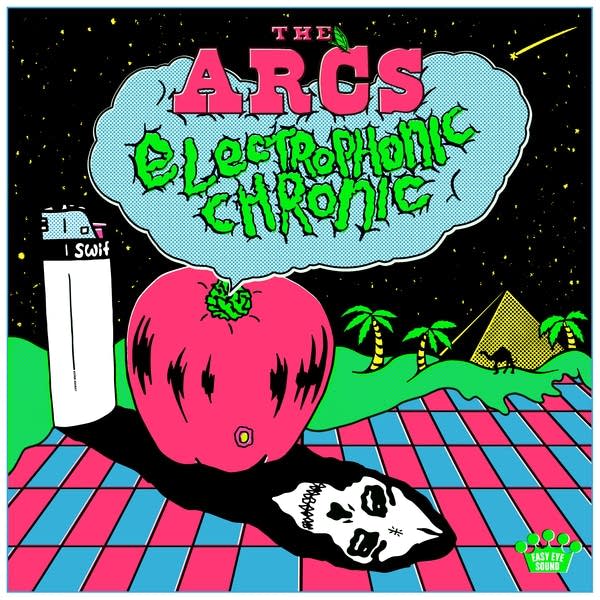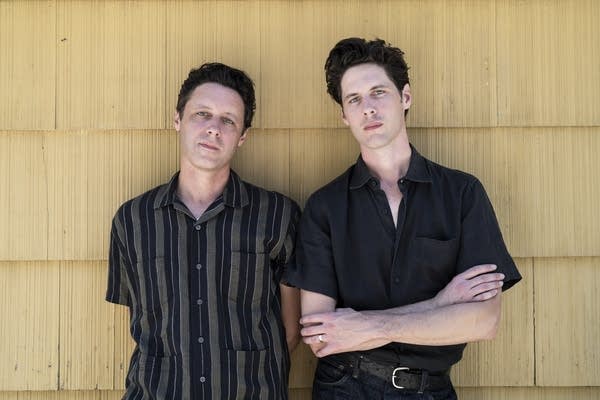Dan Auerbach talks about the new record from The Arcs
by Bill DeVille
January 22, 2023

Dan Auerbach is perhaps best known for his partnership with Patrick Carney in the rock duo Black Keys, but Auerbach is also an established producer, record-label owner (Easy Eye Sound), and multi-faceted musician who has worked with a range of artists.
In a recent conversation with The Current’s Bill DeVille, Auerbach talked about his latest project with the Arcs; specifically, their latest album Electrophonic Chronic. The Arcs’ lineup included the late Richard Swift, whose fingerprints are all over the new record. Auerbach speaks candidly about his late friend, sharing memories and more.
In addition, Auerbach talks about other artists he’s worked with, including some legendary artists.
Listen to the complete interview using the audio player above, and read a transcript of the interview below.
The Arcs’ album, Electrophonic Chronic, releases January 27, 2023.
Interview Transcript
Bill DeVille: Hey, I'm Bill DeVille here at The Current, and I'm here with Dan Auerbach. Dan and his band, the Arcs, have a brand-new album called Electrophonic Chronic. How're you doing, Dan?
Dan Auerbach: Doing good. Thanks so much for having me.
Bill DeVille: So let's start talking about the album. Is it kind of a tribute to Richard Swift, who was one of the main cogs of the Arcs? Did you consider just disbanding the band? Or what made you decide to make this album?
Dan Auerbach: We had an album that was basically finished, and Leon [Michels] and I decided to get together to open up those files and take a listen one more time. And, you know, it'd been a while since Richard had passed. And, you know, we hadn't listened to any of the music. And I think it, honestly, it was really helpful for us, as we were mourning, to listen to that music and go through it, finish this album up, like we'd all intended to do.
Bill DeVille: I imagine that was a really emotional experience to go back and listen to these tapes from — what is it? Three, four or five years ago?
Dan Auerbach: Yeah, it was very heavy. You know, because we'd spent so much time with Richard. We traveled all over the world together multiple times. And it was very hard to say goodbye.
Bill DeVille: I can imagine.
Dan Auerbach: But this was certainly helpful.
Bill DeVille: How would you say this album is different than the debut from the Arcs?
Dan Auerbach: Well, I would say that it's similar in a way because the Arcs had a particular sound you know? When when we would get together, I don't know what it was, this weird little blend of music, and I think it stays true to that first album, you know? So I think it feels very cohesive to me.
Bill DeVille: Now, the song "Eyes" — I just love that song, by the way — and the song "Eyes" as that nice kind of easygoing, psychedelic soul vibe with a, I hear a hint of like Afrobeat keyboards. Can you tell me about how that song came about?
Dan Auerbach: We started just by jamming in the studio together, you know? And I think that I was just automatically just singing "eyes"; just kind of came to me while we were playing. We stuck with that and kind of built on that.
Bill DeVille: The album has such great retro keyboard sounds. Is there some sort of vintage 60s keyboard that's being used on much of the album?
Dan Auerbach: Well, you know, we love that old Ace Tone. I've got this Ace Tone that I've been using for years and years. And you know, Dr. John used it when he was here at the studio. And when Leon plays it, it's amazing, you know, so... I mean, there's all kinds of different keyboards, like a lot of synths and Junos, and there's all kinds of stuff going on, really. Anything was possible when we would be in the studio.

Bill DeVille: So how much of the album was recorded after the passing of Richard? More recently, or was all of it going back, you know, to the days when he was still with us?
Dan Auerbach: All of them go back to the days when he was with us. Everything is from the Swift era. We just buttoned up a couple songs, really; just did some editing, mostly, maybe a couple little overdubs here and there, but this this album was done. I mean, every time we would all get together, we would record, and it was nonstop.
Bill DeVille: And it must have been so hard for you guys to actually get together because you all have, you know, so many different projects cooking, you all had your day jobs, and then you had this as kind of a side project, and you're all in different parts of the country. So how did you make that work?
Dan Auerbach: I mean, it was just any time we were around each other, you know? If I was in New York with Richard, we would go hang out at Leon's. Vice versa Nashville, or if we're on tour and we're driving through Oregon, we would stop at Cottage Grove and go to Richard's studio. It was pretty much any opportunity we got, we took it.
Bill DeVille: So the album is called Electrophonic Chronic, and it's set for release on January 27. Is there any talk of the Arcs doing any touring? Or do you have too many other things cooking to do that at this point?
Dan Auerbach: We don't have any plans to tour at the moment. This wasn't a project that we wanted to put out necessarily and go tour. It just seems weird to tour without Swift, but it sure feels good to hear his voice and hear his drumming, and he's the first thing you hear when you start to record, and it just, it makes us feel good.
Bill DeVille: So are the Arcs still an open book with more to come?
Dan Auerbach: I don't know. Time will tell. Like you said, you know, all of us have day jobs, you know, so you never know.
Bill DeVille: One last question about the record: The album artwork is so cool! So colorful and vibrant. Can you tell us about it?

Dan Auerbach: Yeah, I mean it was partly designed by our friend Omar [Juarez]. He goes by the name El Oms if you want to look him up on like Instagram and stuff. He's a great artist, but he did all of the Arcs' artwork since we started, you know? He hand-drew our first banner when we played our very first show in East L.A., and he did all the artwork on our first record, and you know, we wanted to kind of look like a blacklight poster. Our vinyl actually — they told us it's the first time this has ever been done — but we flocked the cover of our vinyl LP so it feels furry like an old blacklight poster. It's really amazing looking. But there's a lighter on the cover, a little like a Zippo lighter.
Bill DeVille: And doesn't say "Swift" on it? Did I see that, too?
Dan Auerbach: He always did that to his lighters. He always put his — he had a little label maker, and he would put his name on there.
Bill DeVille: He puts his name on his lighter. That's so cool! I get the impression that the Arcs are, you know, in essence, a whole bunch of vintage-studio rats and vinyl junkies. Is there truth to that?
Dan Auerbach: Absolutely. You know, we definitely bonded over our love of the studio, and our love of records, old records, playing 45s. You know, those studios and pressing 45s, they kind of used to go hand in hand, places in Jamaica and London, and all these amazing places in Memphis and Louisiana and Miami and just crazy, amazing regional records they used to make all over the place. And so when we were together and we were on tour, we would stop at record shops, every city we'd go to, and we'd set up little impromptu DJ gigs, just to spin records at a place and hear it on the big speakers. You know, that was a big part of, you know, how we all clicked and, you know, what we like to do.
Bill DeVille: I love that old sound system. You mentioned Jamaica — the sound system setup that the Jamaicans used to use, you know, with a van and all.
Dan Auerbach: Absolutely!
Bill DeVille: You ought to go on tour like that!
Dan Auerbach: I would love to do that. I've talked about that! Those sound systems are incredible. I love looking at the pictures of those.
Bill DeVille: So you had a pretty good year at Easy Eye Sound in 2022, the Hermanos Gutierrez album, and Marcus King, and that Son House record. Tell us about the duo Hermanos Gutierrez, who you actually, you play guitar on the record, too, didn't you a little bit?
Dan Auerbach: I did. I played on one song, which was a real honor. I don't, you know, they've never had anyone play on any of their records, it was cool. And they're just an incredible duo. They're from Europe, but their mother's from South America. And they just have this incredible blend of instrumental guitar music, and it's kind of like Spaghetti Western in a way. Yeah, I hear that. Their manager sent me some music, and I heard 10 seconds of it and I stopped it, and I said, "I want to talk to these guys." As soon as we met, it was like there was an instantaneous bond. And we made the album together very quickly. And they just did their first tour of North America and it was completely sold out.

Bill DeVille: The Marcus King record did really well. I know he had a sold-out show here in the Twin Cities. That's a great sounding record, too.
Dan Auerbach: Yeah, Marcus is phenomenal. And that album, you know, we were inspired by those old boogie records that were just like three-piece band. Like no overdubs; just very raw, like almost like you would hear these bands on stage. And Marcus allowed me to pick a couple of my favorite musicians — Chris St. Hilaire on drums and Nick Movchon on bass, two of like the most amazing musicians that I know — and put them in the studio with Marcus, who's a complete virtuoso, one of the greatest singers I've ever heard, one of the greatest guitar players I've ever heard. And we made them cut this record live, and they locked in so hard. And the record is tough as nails. It's so fun to listen to.

Bill DeVille: So you've worked with artists like Dr. John, and you did that Tony Joe White record, Yola, Hank Williams, Jr., and let's see, Lana Del Rey... Who's on your wish list who you haven't worked with yet?
Dan Auerbach: You know, whatever catches my ears is who I want to work with, you know? I don't concern myself with what genre it is, or the age of the person, it's all about: Does it move me? And being in the Black Keys allows me the luxury of not having to kind of work for the man, you know what I mean? I pick and choose the projects I produce, and so I've gotten to work with some amazing musicians. But there's definitely some musicians I'd love to work with, but I wouldn't want to jinx it
Bill DeVille: I did see that you have a co-write with my friends here in the Twin Cities, the Cactus Blossoms, you have a co-write on their song "Got A Lotta Love."
Dan Auerbach: Yes!
Bill DeVille: Yeah, it's a great song.
Dan Auerbach: Yeah. We hung out and wrote some songs together. I love those guys. I was raised on bluegrass music, my mom's family all played bluegrass, and they taught me very early about sibling harmonies, you know, and they played me the Stanley Brothers, and they played me the Everly Brothers. And you know when I heard the Cactus Blossoms it was like, "Oh, yeah. These guys, these guys got it."

Bill DeVille: Well, I see the Black Keys have some European dates set up for next summer along with Spoon as an opening act. That's a pretty solid double bill.
Dan Auerbach: Heck yeah. We love those guys, and we've known him for years.
Bill DeVille: Yeah, I imagine your paths crossed a lot, as you've been a band about exactly the same length of time, the early 2000s?
Dan Auerbach: Oh, yeah, man. We've known them for years and have played shows with them forever. And they've always been the greatest guys.
Bill DeVille: Well, here's a here's a question for you: You've been doing this for a long time. And so what would you think is your greatest accomplishment musically so far?
Dan Auerbach: I was second chair in the jazz band playing trumpet in high school.
Bill DeVille: Not bad. You know, one of the, I still remember just a few years ago when John Prine was still with us. I was lucky enough to see you join him. What was that like for you playing with John Prine and working with him and knowing him?
Dan Auerbach: It was like a dream come true. Moving to Nashville and having Dave

Ferguson, who's produced Sturgill Simpson and Tyler Childers records. We became buddies like the year I moved to Nashville 12 years ago, and he instantly like took me under his wing and introduced me to all these veterans in the city: Cowboy Jack Clement You met Cowboy Jack? I hung out with Cowboy! Cowboy came to Easy Eye, and he waltzed across the studio floor with my ex wife. You know, he introduced me to all these incredible people, but Prine was one of them, and he'd been buddies with for years and years. Decades! Prine would open up to Ferg in a way that he wouldn't to anybody else I ever saw him around. And it was amazing to be around him in those moments. You know, we'd hop in Prine's Cadillac, and he would take us over, you know, we'd drive over to White Castle. Prine always had these cassette tapes that were dubs of New Orleans radio.
Bill DeVille: Oh, really?
Dan Auerbach: That's what would be playing in the car. It was awesome. And I just have so many great memories of hanging out with him and a couple of times that I got to write with him. It was like magic.
Bill DeVille: I can imagine. Hey, Dan, it's been so nice talking with you.
Dan Auerbach: Yeah, thank you so much.
Bill DeVille: The new album is called Electrophonic Chronic from the Arcs. Great sounding record, Dan, I just love it. And it's set for release on January 27.
Dan Auerbach: Thank you so much.
External Links
The Arcs - official site
Easy Eye Sound - official site
